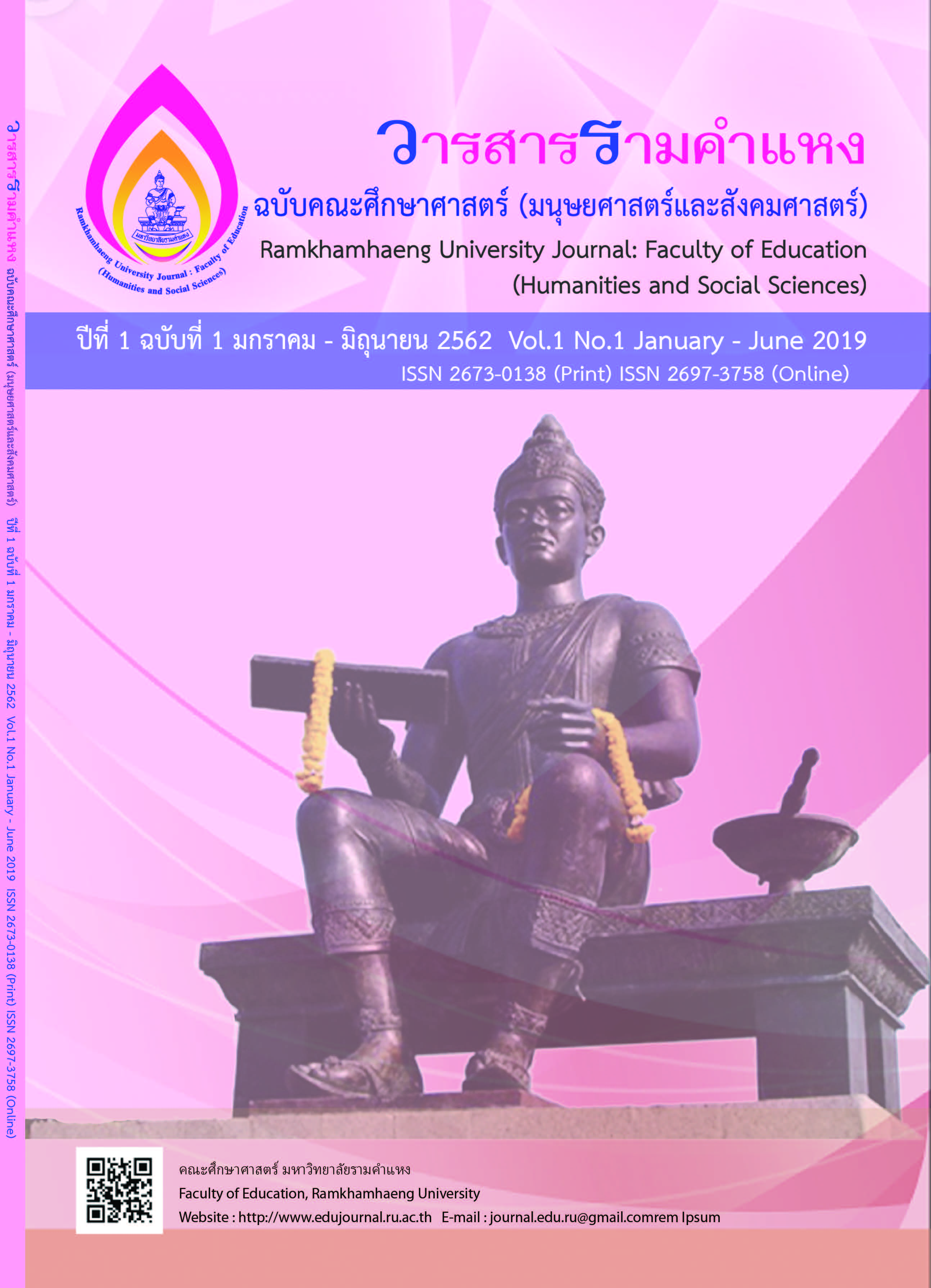The Influence of Education Philosophy Upon High School Students’ Performance in Bangkok Metropolitan
Main Article Content
Abstract
Educational philosophy is the guiding principle for education administration. It is the way educators perceive and interpret the world. Hence, they organize the administration of teaching and learning accordingly. The way teachers teach depends on the way they belief in the truth of the world. Educational philosophy is categorized into 5 taxonomies namely Essentialism, Perennialism, Progressivism, Social Reconstructionism, and Existentialism.
In Thailand, many researchers supported one more philosophy, namely, Buddhism based on Buddhism religion which is pervasively adopted in Thailand. Essentialists believe that learning should be performed through memorizing the materials of subjects and traditional knowledge and wisdom are deemed valuable. Perennialists believe that educators should teach the fact about nature. Progressivists believe in the process of knowledge creation. Reconstructionistsaim to educate learners with the knowledge to change the society. Existentialists believe that learners have freedom to choose what and how they learn. Buddhism philosophy believes that education should assist people to think logically and help the society. This research aimed to investigate the educational philosophies high school principalsuse and to assess the influence of educational philosophy and students' performance, specifically GPA. Samples consist of 559 principals of schools in Bangkok under the jurisdiction of the Office of the Basic Education Commission in Thailand. The samples were asked to identify the educational philosophy they were using. Moreover, average GPAs of all students in the respective school were collected as the measure of students' achievement in each school. One-way ANOVA was utilized to investigate the influence of education philosophy upon student's achievement. Results suggested that Buddhism educational philosophy yielded lowest GPAs. School followed Existentialism yielded highest GPA followed by Social Reconstructionism, Essentialism, Progressivism, Perennialism, and Buddhism philosophies respectively. Tests of statistical significance revealed that Existentialism and Social Reconstructionism philosophies yielded better results than other philosophies.
Downloads
Article Details

This work is licensed under a Creative Commons Attribution-NonCommercial-NoDerivatives 4.0 International License.
ผู้ส่งบทความ (และคณะผู้วิจัยทุกคน) ตระหนักและปฎิบัติตามจริยธรรมการวิจัยอย่างเคร่งครัด ทั้งนี้บทความ เนื้อหา ข้อมูล ข้อความ ภาพ ตาราง แผนภาพ แผนผัง หรือข้อคิดเห็นใดๆ ที่ปรากฎในบทความ เป็นความคิดเห็นและความรับผิดชอบของผู้ส่งบทความ กองบรรณาธิการไม่จำเป็นต้องเห็นตามเสมอไป และไม่มีส่วนรับผิดชอบใดๆ โดยถือเป็นความรับผิดของของเจ้าของบทความเพียงผู้เดียว
References
Alauddin, M., & Ashman, A. (2014). The changing academic environment and diversity in students' study philosophy, beliefs and attitudes in higher education. Higher Education Research & Development, 33(5), 857-870.
Bernard, W. (2006). Philosophy as a humanistic discipline. Princeton: Princeton University Press.
Christopher, W. (1999). Key concepts in the philosophy of education. London: Routledge.
Guardia, D. L., Gentile, M., Grande, V. D., Ottaviano, S. & Allegra, M. (2014). A game-based learning model for entrepreneurship education. Procedia-Social and Behavioral Sciences, 141, 195-199.
Harold, A. J. (2004). An Introduction to the love of wisdom: An essential and existential approach to philosophy. Lanham, Maryland: Rowman and Littlefield.
Henniger, M. L. (2004). The teaching experience: An introduction to reflective practice. Upper Saddle River, NJ: Pearson Education.
Kneller, G. (1971). Introduction to the philosophy of education. NY: John Wiley & Sons.
Kolb, D. A. (2015). Experiential learning: Experience as the source of learning and development (2nd ed.). Upper Saddle River, NJ: Pearson FT Press.
Komolsevin, R., Knutson, T., Tanchaisak, (2011). A comparison of elephants and eagles: Thai and American communication behavior. Bangkok, Thailand: Wang Aksorn Press.
Leal-Rodriguez, A., & Albort-Morant, G. (2018). Promoting innovative experiential learning practices to improve academic performance: Empirical evidence from a spanish business School. Journal of Innovation & Knowledge, 4(2), 97-103.
Lockett, N., Kerr, R., & Robinson, S. (2008). Multiple perspectives on the challenges for knowledge transfer between higher education institutions and industry. International Small Business Journal: Researching Entrepreneurship, 26(6), 661-681.
Mautner, T. (1996). A dictionary of philosophy. Cambridge, MA: Blackwell.
Oxford Business Group. (2016). The report: Thailand 2016. Retrieved September 20, 2018, from https://oxfordbusinessgroup.com/thailand-2016/sustainability
Ozman, H., & Craver, S. (1999). Philosophical foundations of education (6th ed.). Upper Saddle River, NJ: Merrill/Prentice Hall.
Panorum, P. (2016). The action research in order to access the efficiency of the instructional management under the Thai education philosophy standard in the high school in Buriram province. Journal of Research and Development Buriram Rajabhat University, 11(1), 81-92. [in Thai]
Ruenglertboon, F. (2006). Higher education philosophy of his majesty King Bhumibol Adulyadej (Doctoral Dissertation). Faculty of Education, Chulalongkorn University, Bangkok, Thailand. [in Thai]
Solomon, R. C. (2005). Introducing philosophy: A text with integrated readings. London: Oxford University Press.
Webb, L., Metha, A., & Jordan, K. (2000). Foundations of American education (3rd Ed.). Upper Saddle River, NJ: Merrill/Prentice Hall.
Wongduen, D. (2015). The education philosophy of sufficiency economy in secondary schools under the jurisdiction of 28 districts (Master Thesis). Faculty of Education Administration, Rajabhat Srisaket University, Srisaket, Thailand. [in Thai]
Wongthamma, T. (2012). The basics of educational philosophy: Western vs. eastern wisdoms. Bangkok: Odean Store. [in Thai]


